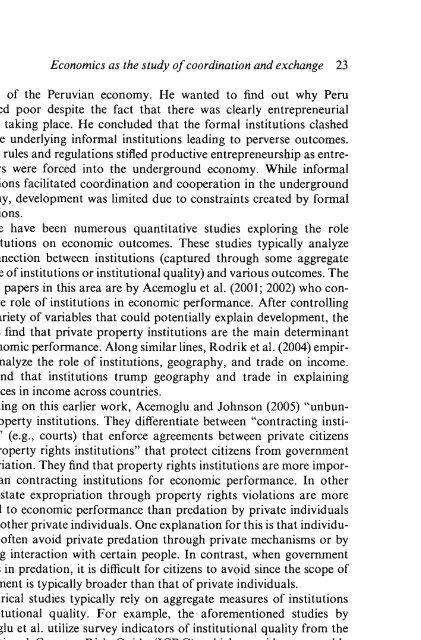Handbook on Contemporary Austrian Economics
Handbook on Contemporary Austrian Economics
Handbook on Contemporary Austrian Economics
Create successful ePaper yourself
Turn your PDF publications into a flip-book with our unique Google optimized e-Paper software.
Ec<strong>on</strong>omics as the study of coordinati<strong>on</strong> and exchange 23<br />
porti<strong>on</strong> of the Peruvian ec<strong>on</strong>omy. He wanted to find out why Peru<br />
remained poor despite the fact that there was clearly entrepreneurial<br />
activity taking place. He c<strong>on</strong>cluded that the formal instituti<strong>on</strong>s clashed<br />
with the underlying informal instituti<strong>on</strong>s leading to perverse outcomes.<br />
Formal rules and regulati<strong>on</strong>s stifled productive entrepreneurship as entrepreneurs<br />
were forced into the underground ec<strong>on</strong>omy. While informal<br />
instituti<strong>on</strong>s facilitated coordinati<strong>on</strong> and cooperati<strong>on</strong> in the underground<br />
ec<strong>on</strong>omy, development was limited due to c<strong>on</strong>straints created by formal<br />
instituti<strong>on</strong>s.<br />
There have been numerous quantitative studies exploring the role<br />
of instituti<strong>on</strong>s <strong>on</strong> ec<strong>on</strong>omic outcomes. These studies typically analyze<br />
the c<strong>on</strong>necti<strong>on</strong> between instituti<strong>on</strong>s (captured through some aggregate<br />
measure of instituti<strong>on</strong>s or instituti<strong>on</strong>al quality) and various outcomes. The<br />
seminal papers in this area are by Acemoglu et al. (2001; 2002) who c<strong>on</strong>sider<br />
the role of instituti<strong>on</strong>s in ec<strong>on</strong>omic performance. After c<strong>on</strong>trolling<br />
for a variety of variables that could potentially explain development, the<br />
authors find that private property instituti<strong>on</strong>s are the main determinant<br />
for ec<strong>on</strong>omic performance. Al<strong>on</strong>g similar lines, Rodrik et al. (2004) empirically<br />
analyze the role of instituti<strong>on</strong>s, geography, and trade <strong>on</strong> income.<br />
They find that instituti<strong>on</strong>s trump geography and trade in explaining<br />
differences in income across countries.<br />
Building <strong>on</strong> this earlier work, Acemoglu and Johns<strong>on</strong> (2005) "unbundle"<br />
property instituti<strong>on</strong>s. They differentiate between "c<strong>on</strong>tracting instituti<strong>on</strong>s"<br />
(e.g., courts) that enforce agreements between private citizens<br />
and "property rights instituti<strong>on</strong>s" that protect citizens from government<br />
expropriati<strong>on</strong>. They find that property rights instituti<strong>on</strong>s are more important<br />
than c<strong>on</strong>tracting instituti<strong>on</strong>s for ec<strong>on</strong>omic performance. In other<br />
words, state expropriati<strong>on</strong> through property rights violati<strong>on</strong>s are more<br />
harmful to ec<strong>on</strong>omic performance than predati<strong>on</strong> by private individuals<br />
against other private individuals. One explanati<strong>on</strong> for this is that individuals<br />
can often avoid private predati<strong>on</strong> through private mechanisms or by<br />
avoiding interacti<strong>on</strong> with certain people. In c<strong>on</strong>trast, when government<br />
engages in predati<strong>on</strong>, it is difficult for citizens to avoid since the scope of<br />
government is typically broader than that of private individuals.<br />
Empirical studies typically rely <strong>on</strong> aggregate measures of instituti<strong>on</strong>s<br />
or instituti<strong>on</strong>al quality. For example, the aforementi<strong>on</strong>ed studies by<br />
Acemoglu et al. utilize survey indicators of instituti<strong>on</strong>al quality from the<br />
Internati<strong>on</strong>al Country Risk Guide (lCRG), which provides a m<strong>on</strong>thly<br />
analysis of ec<strong>on</strong>omic, political, and financial risks for numerous countries.<br />
The ICRG places particular focus <strong>on</strong> the risk of expropriati<strong>on</strong> of<br />
property. The Rodrik et al. study relies <strong>on</strong> the "Governance Matters"<br />
index, which attempts to measure the quality of public service provisi<strong>on</strong>,

















